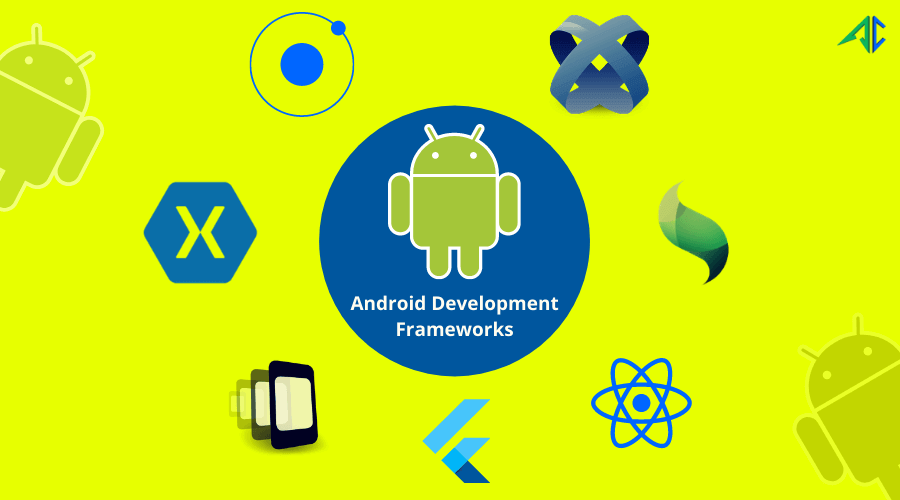Table of Contents
Android’s popularity has led many businesses to incline towards developing Android-based apps. However, the choice of framework is always a concern for many. Well, no more! In this blog, we will list the top Android app development frameworks to ease your job.
With a rise in internet usage, shift to mobile, and nearly 90% of mobile internet time is spent only on apps, businesses have realized that apps are vital for making strong connections with customers. With over 84% of market share worldwide, 2 billion user bases, and approx 1.5 billion downloads every month, the evolution of Android OS is quite evident; it has gained massive popularity over time due to its advantageous offerings.
Being highly customizable, Android development brings in various advantages; that’s why it’s currently deemed the best OS for building apps. Due to the increase in Android and lots of development frameworks coming in, selecting the right framework for Android development has become complicated. That’s why most businesses are looking for a reliable Android development company that can meet all the demands and back their apps with the right framework.
Before we dive in and learn about the top Android application development frameworks available out there, let’s first know about what exactly is an app development framework and what is the need for having one.
What Is an App Development Framework?
An application development framework is basically software designed to support mobile app development. In simpler words, an application framework is a software toolkit that gives apps the needed structure, enabling app developer companies to piece together a finished product that meets the business’s requirements.
How to Choose the Right App Development Framework?
Choosing the right mobile app development frameworks can sometimes be daunting, especially for startups. However, a little thought and reflecting in advance, like gauging the app requirements, business needs, and more, can help you choose the right Android app development framework.
Choosing the right app development framework becomes crucial than ever because it helps you stay ahead of the curve these days and bring more downloads and users. One must keep in mind some major factors while choosing the framework (according to the requirement) are platforms, speed considerations, cost, frame risk, smoothness, efficiency, updates, and more.
Top 7 Android Development Frameworks You Must Know About
Ionic
Ionic is a free, open-source, cross-platform app development framework that uses HTML5, CSS3, and JavaScript for intuitive hybrid app development. The developed apps run across multiple devices. It has grown into one of the most popular frameworks for Android application development because of its cross-functionality. Ionic encompasses a myriad of software tools, gestures, and animations that facilitate the development of top-notch Android mobile apps.
Key Features of Ionic Framework:
- Cross-Platform
- Web Standards-Based
- Attractive Design
- Simplicity
- Platform Independent
- AngularJS-Based
- Cordova Plugins Support
- Extended Technology
- Powerful Extension
React Native
According to a recent survey, React Native is the most popular cross-platform mobile framework used by global developers. React Native development makes the process much easier, faster, and cost-effective by using platform-based interface components and built-in APIs for inducing a natural look and feel. Its ‘hot-reload’ feature enables developers to update files without disrupting the current state of the app.
Key Features of React Native Framework:
- UI-Focused
- Third-Party Library Support
- Faster Development
- Cost-Effective Development
- Tried and Trusted Framework
- Huge Community Support
- Modular and Intuitive Architecture
- Live Reloading
- Strong Performance
Flutter
Flutter is Google’s app development framework that adopts a unique approach compared to other frameworks. It streamlines the multi-platform development process to build high-quality interfaces for Android. Though the debate between React Native vs Flutter is never-ending, Flutter proves to be a solid testing framework for performing UI, unit, and functionality tests. Flutter features include a screen reader, faster development cycle, and quicker rendering and themes for Android.
Key Features of Flutter Framework:
- Integration, Flexibility, and Scalability
- Hot Reload Feature
- Huge Widget Library
- Alike Native Performance
- Increased Time-to-Market
- Own Rendering Engine
- Platform-Specific Implementation
Xamarin
Xamarin is yet another must-try app development framework owned by Microsoft, used for building performant and modern Android apps with .NET. Xamarin boasts an advanced toolset through which developers can work with a shared code in C# or XAML. The recent visual studio IDE developed tools have led many industries like healthcare and energy to shift over to it.
Key Features of Xamarin Framework:
- Native-like Performance
- Full Hardware Support
- Single-Technology Stack
- Device-Compatibility
- APIs Integration
- Useful Compiled Code
- Huge Community and Support
Sencha Touch
Sencha Touch is a framework that focuses explicitly on building native mobile applications. It used JavaScript and HTML5, allowing it to create dynamic and comprehensive apps. Android apps developed with Sencha Touch deliver high performances as the framework incorporates hardware acceleration techniques. With over 50 UI components, this framework helps develop captivating Android apps.
Key Features of Sencha Touch Framework:
- Easily Customizable
- Rich Widget Components
- Transitions, Animations, and UI
- Intuitive Tools and Plugins
- GUI-Based Controls
- Out-of-the-box Native-looking Themes
Appcelerator Titanium
Appcelerator Titanium is also a free and open-source application development framework that allows developers to create native apps using web technologies such as HTML5, JavaScript, and CSS3 without having to learn Java or Objective-C.
Developers can create multi-platform applications by deploying around 60%-90% of the existing code. Apps developed with this framework show performance equal to apps written using native APIs.
Key Features of Appcelerator Titanium Framework:
- Single Code Base
- Native API Accessibility
- Standard-Based and Rich UI Components
- Hardware-Specific Features
Adobe PhoneGap
Adobe PhoneGap is an open-source framework that is backed by Adobe and Apache. This app development framework uses modern technologies such as HTML5, CSS3, and JavaScript, to create and design apps. It enables working without hardware-specific limitations. Developers prefer this framework because it allows them to view and check the changes they make at the same time as they work on an application.
Key Features of Adobe PhoneGap Framework:
- Robust Back-End
- Greater Flexibility
- Platforms-Compatible
- Easy Development
- Cost-Effective Development
- Native APIs Accessibility
- Large Community Base
The Bottom Line
Development frameworks are the foundation of any Android app development. Though every application has a different and unique set of requirements, the framework’s choice must be made keenly. The one that fulfills all your app needs is the best Android app development framework for you. We hope you will make the right choice from the aforementioned lists. Good luck!
We would love to hear your comments relating to the post. Got some other thoughts? Drop us words through our contact page.







